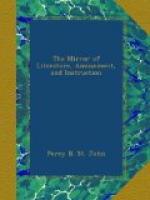At length she grew calm, but it was the fearful calmness
of despair; she complained not—reproached
not; for she felt that she had been self-deceived;
she could not, however, conceal the devastation which
sorrow was making in her graceful form. Albert
beheld her with concern, but ascribed the alteration
to her grief for his father’s loss, for Isabel
had tenderly loved her uncle. She rejoiced at
his mistake, and attempted not to undeceive him:
one only wish possessed her—it was, to see
the chosen of her Albert; and, with a feverish impatience,
she urged him to accelerate his nuptials. The
appointed day arrived—Isabel, attired in
robes of richest state, stood beside the altar, and
witnessed the annihilation of all her earthly happiness;
still she sunk not; but, with a mighty effort, pronounced
a blessing on the wedded pair. The excitement
brought back a vivid colour to her cheeks, and rekindled
the lustre of her large dark eyes. The painter
had seized that moment to depict her glowing form—the
enthusiasm was but momentary—her angel
face soon lost its lovely tint, and her beautiful eyes
sunk again into languor. The castle was thronged
with noble guests—sick at heart the wretched
Isabel wandered abstractedly amid the gay assembly—her
large floating eyes seemed straying vacantly around,
until they met the bridegroom’s look of joy.
Then came the madness of recollection; with a convulsive
shuddering she averted her head, and stole unnoticed
from the company. Morning came, but she appeared
not; her chamber was searched—she had not
entered it. Albert flew distractedly into the
park, and, at length perceived her quietly sitting
by the side of the lake, near a bower, which, when
a boy, he had helped to decorate. She was still
clad in the robes of last night’s festival.
He ran eagerly towards her—she spoke not—he
entreated her to answer him, but he implored in vain—there
was neither breath, nor sense, nor motion—she
was dead! ’Twas a mournful sight! one white
hand, stiffened to marble, was pressed upon her broken
heart, as she had sought to stay its painful throbbings—the
cold night dews hung in large drops upon her silken
hair, and shed a tremulous gleam upon the diamonds
that sparkled on her pale, icy forehead—the
withered leaves had found a resting place upon her
bosom, and her white garments were embroidered by their
many colourings. The castle became hateful to
Albert after this event: he removed to a distant
part of the country, and never again revisited the
scenes of his earlier years. He also was dead;
and Isabel, her love, and her despair, were forgotten
by all, save one aged, isolated being, whose time-whitened
locks and decrepit frame showed that she too was rapidly
descending to the silence of the grave.
London University Magazine. No. II.
* * * * *
NOTES OF A READER.
* * * * *




